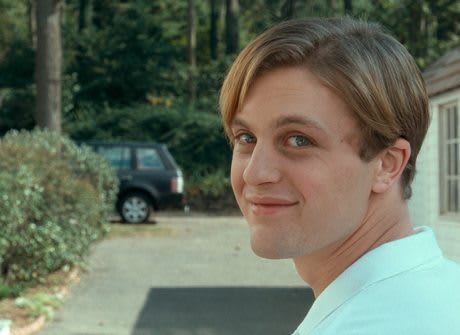Just to get it out of the way, noted misanthrope and expert director Michael Haneke describes Funny Games as a response to the flippant, stylized, glorified violence of Tarantino and his merry band of poseur proponents. It's less a criticism of their style and merit and more an observation that taking pleasure in the suffering of others, even vicariously, is indicative of thinly veiled social hostilities. Furthermore, their narrative familiarity and safety in genre conventions provide enough viewer security to placate and numb, especially within the constructed superhuman reality where "good guys" are never in any real danger and violence has no consequences. From the start, Haneke's cinematic plea – both the Austrian original and his American remake – keep the audience conscious of their role as viewer, showing happy family Ann (Naomi Watts), George (Tim Roth) and Georgie (Devon Gearhart) driving to the cottage with non-diegetic death metal contradicting their serenity. When Paul (Michael Pitt) and Peter (Brady Corbet) show up with big smiles and flawless monochromatic attire, their exploitation of social niceties in asking to borrow eggs and golf clubs acts as a test, or game, to see how far they can push well-adjusted people before they snap out of their prescribed friendliness. In fact, what makes the family vulnerable is their implicit trust and openness of strangers. Sure, they initially see these boys standing with their neighbours, suggesting third-party acceptance, but is this assumptive optimism potentially dangerous in a culture with repressed violent desires? Despite this challenging of our communal ethos, there is still an assumption of good prevailing when the family is tied up and subjected to a series of perverse wagers and mind games. It's only when Paul turns to the camera and asks us for our opinion – later rewinding the film to change the outcome – that we realize our assumptions are naïve, merely embedded in expectations. Some have argued that this straight, almost shot-by-shot remake of Funny Games is a cultural moot point, limiting its focus to that of the aforementioned genre criticisms. But there's more going on than just passive audience vilification. Similar to The White Ribbon, Haneke is challenging the social expectation of passively adapting to a dominant norm. Since he makes films about his basic fears, he's observing that our assimilative values, behaviours and moral codes are so indoctrinated in our collective psyche that something as simple as confronting rigid narrative constraints comes as a shock. He's suggesting that we aren't even aware of our tendency to adapt to a narrow ideologue that, in application, leads to exclusion and punishment of difference, as outlined in Ribbon. While some may dismiss him as a mere misanthrope, or refute his acute human observations to avoid basic annihilation anxieties, few could deny that Haneke is an excellent filmmaker with a clear, distinctive vision. If you haven't already, it's time to take a minute and consider just what he's trying to communicate with his catalogue of films. No supplements are included with the Blu-Ray, nor are they necessary.
(eOne)Funny Games U.S. [Blu-Ray]
Michael Haneke

BY Robert BellPublished Nov 17, 2010